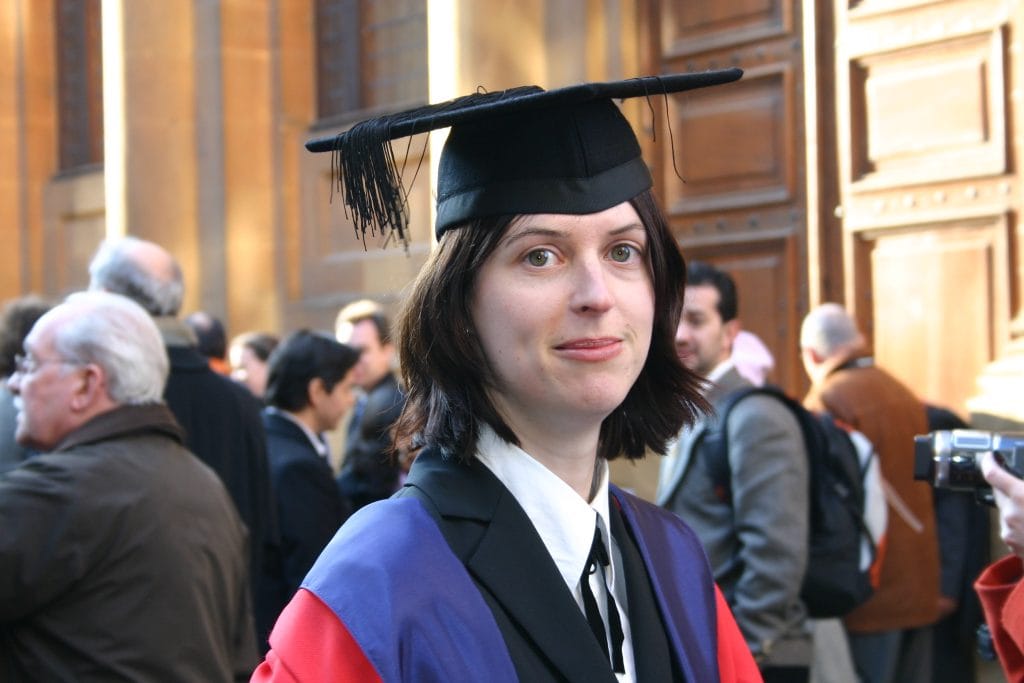I had a difficult time finishing my PhD thesis, 20 years ago.
At the time, I’d accepted a full-time postdoc position on someone else’s project, promising to finish my thesis before the job started — but I didn’t. So I had to continue rewriting my chapters and writing my conclusion on “extra” time: in the evenings and weekends, and during a percentage of my worktime my employer let me use for my thesis.
Everyone was telling me that I needed to be efficient now, and fast — just get through this now, then regain my life. I agreed, vowed to myself and others to do everything I could to get this done asap, worked very long hours… and despaired at how hard it was to add the necessary sections and make edits that actually moved the text forward.
It wasn’t working.
It wasn’t working until, completely at my wits’ end, I got myself to stop caring about the pressure, my PI’s increasing unhappiness, and the guilt of missing the deadline — and to start accompanying myself again.
Coming back, staying close
In my imagination, this shift, which I can still viscerally feel, looks something like this:
I've run way ahead of myself, so I am divided: there's a part of me left behind that has a hard time following.
But now I stop, turn around, and make my way back to that "lagging" part, take my place right beside it again. Now we go together, moving more slowly, yes, but also on ground that feels more solid.
Now I am like two friends setting out on a trail in the mountains, not knowing what they’ll find along the way, but comforted and strengthened by each other's company.
There’s research on how walking up a steep hill seems and feels physically easier when there’s someone with you. That’s the effect of being accompanied.
Even simply thinking about a supportive person can have such an effect. And that person can also be yourself.
Accompanying myself to finish my thesis felt like a fierce act, and also one of surrender. I took time to revisit my chapters. Then I wrote my conclusion from a renewed sense of what was in these chapters.
At the viva, my external examiner said he was surprised the conclusion was so thorough. He said: “Most PhD candidates have run out of time and energy by the time they write this last part.”
I, too, had run out of time and energy: the thoroughness wasn’t evidence to the contrary, it was simply how I had been able to stay close to my project and walk myself to the finish line. Judgments about whether this was good or bad, whether faster or thorougher is better, had nothing to do with it. This was just the way it was, how I had been able to write my thesis to completion.
Self-accompaniment as a practice
If you are in a place of struggle with your writing, it’s worth exploring the language and imagery of self-accompaniment to see if it could be of use to you.
How does do these words — accompanying, company, companionship — feel, compared to other constructs for getting yourself back on track with writing such as “accountability”?
What does “coming back to accompanying yourself” look like in your imagination?
How does it shift your emotional and physical energy for writing?
…
For me, self-accompaniment hasn’t lost its strengthening quality, nor has it stopped being a practice. Finishing writing is still hard a lot of the time, and I get into that place of wanting to be someone else: a writer who can deliver more reliably within set timeframes, a “better” writer. It usually takes a while before I notice I’ve become divided. Coming back to accompany myself again still always has the quality of fresh learning.
In my work as a coach and facilitator, I support other writers in finding paths forward, and I often marvel at how different it is — what works for one person versus another. When people find their own strategies (language, imagery, embodied techniques, etc.) that reconnect them to their intellectual and creative powers, it’s really beautiful. Often, underlying this is a move back to self-accompaniment.

Cultivating a Sustainable Writing Practice, my 8-week online programme for academic writers, starts again on 3 October 2025.
Image credits:
- Mountain under leaden sky by Vinu Malhari
- Portrait by Alfons van Stiphout




